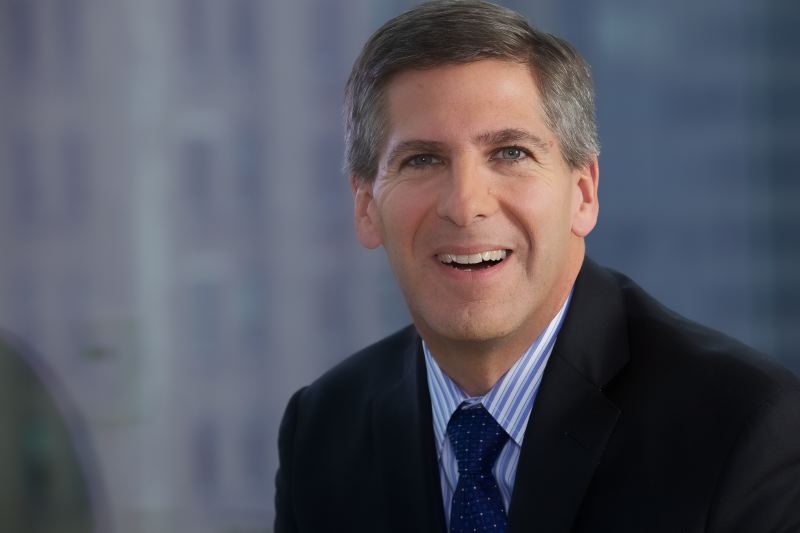 Bob Moritz, U.S. Chairman of PricewaterhouseCoopers (PwC), says that “The white man can actually help drive the success of a diversity program”, and he’s one white man who has stepped up and made a real difference for women in the workplace at PwC and other organizations.
Bob Moritz, U.S. Chairman of PricewaterhouseCoopers (PwC), says that “The white man can actually help drive the success of a diversity program”, and he’s one white man who has stepped up and made a real difference for women in the workplace at PwC and other organizations.
Bob is a man of action and a role model for all CEO’s, male and female, who are looking to attract and retain the best talent. As a result, he has joined the MAKERS movement as a Manbassador and will be attending their conference in February in California.
In my recent interview with Bob, he spoke about his commitment to gender equality in the workplace.
Bob Moritz:
As a professional services firm, you need the best talent. You want to get the best talent. You have to have the most diverse talent. You actually have to make sure you have the focus and attention to make sure you’re doing all you can to attract, retain, develop, and deploy that talent. So, when I then translate that into, why I have a personal interest in it – I’d say, there are three broad themes. One, I’m, in essence, the CEO of this place. And if I don’t set the tone at the top, in terms of what we’re trying to accomplish, what we stand for and incent role models, and deal with the biases or preferences that might be in an organization from a culture perspective, then I’m not doing my job. Second, as I tell everybody, there are a number of different reasons why the topic of women, topic of diversity, or topic of inclusiveness – call it what you want – should be important to people. There is the business case; the performance of an organization will be better as a result of better thinking, better talent, et cetera. Third, it’s the right thing to do from a stakeholders’ perspective; that being either the organizations you serve, the society you’re in, the people that you have in your organizations. And that’s the current talent you have, as well as the future talent. And, last but not least, there’s a real personal interest.
Bonnie Marcus:
What is your personal interest in the diversity initiative?
Moritz:
From my personal perspective, there were probably three instances in my own story that were really influential around the rationale as to why diversity’s important to me. And the first one was spending the year on human capital gives you a different perspective around how to deal with the people side of a business. Second was the time I spent in Japan where, in essence, I was the minority. I knew, as close as I possibly could without having the color of my skin or my race being changed, what it was like to be that minority; arguably, be discriminated against, et cetera. And third, having gone through a divorce and being single and the parent of two kids – and when needed, as needed, and as desired – to try to deal with the challenges of single dad, you can relate as much as possible without being a woman. So, there’s a personal basis for my desire to be engaged in this stuff, in addition to this business rationale, and the business case, as well as, then having the obligation as the leader of the firm to set the right tone.
Marcus:
What do you see your role as a Manbassador for the Makers Conference?
Moritz:
I’d say it’s three-fold. One, I’m there to learn and connect, right? So there’s an element of us learning as well. We don’t have a monopoly or oligopoly on all of the great ideas of what we do at PwC. We’re in a continuous improvement mindset. And we’re not as far along as I’d like us to be, but we’re getting there. So one is the lesson learned. And that then enables me, as a Manbassador to then tell the similar stories of the value I got out of attending to other CEOs, government officials, and the like, male or female; to get them to want to be at the conference the next time. And then, the third thing, I would say is personal learning; to hopefully contribute in a meaningful way so that others are learning as well from us, such that, there is a benefit from us being there. So I have to learn and I have to contribute. And it has to be a two-way conversation. We have to lead by example. If the Manbassadors are not being seen as leaders and role models in this place, then it’s not going to do us any good. And it’ll fail by example. And let’s be clear, too, what the Manbassador needs to do is not a one-time thing. They can’t just show up and give a nice speech. They’ve got to be able to be seen as 365, 24-7, committed to inclusiveness, diversity, or a gender-related initiative in their organization, to really have the impact, and being seen as deserving of that Manbassador title.

Recent Comments